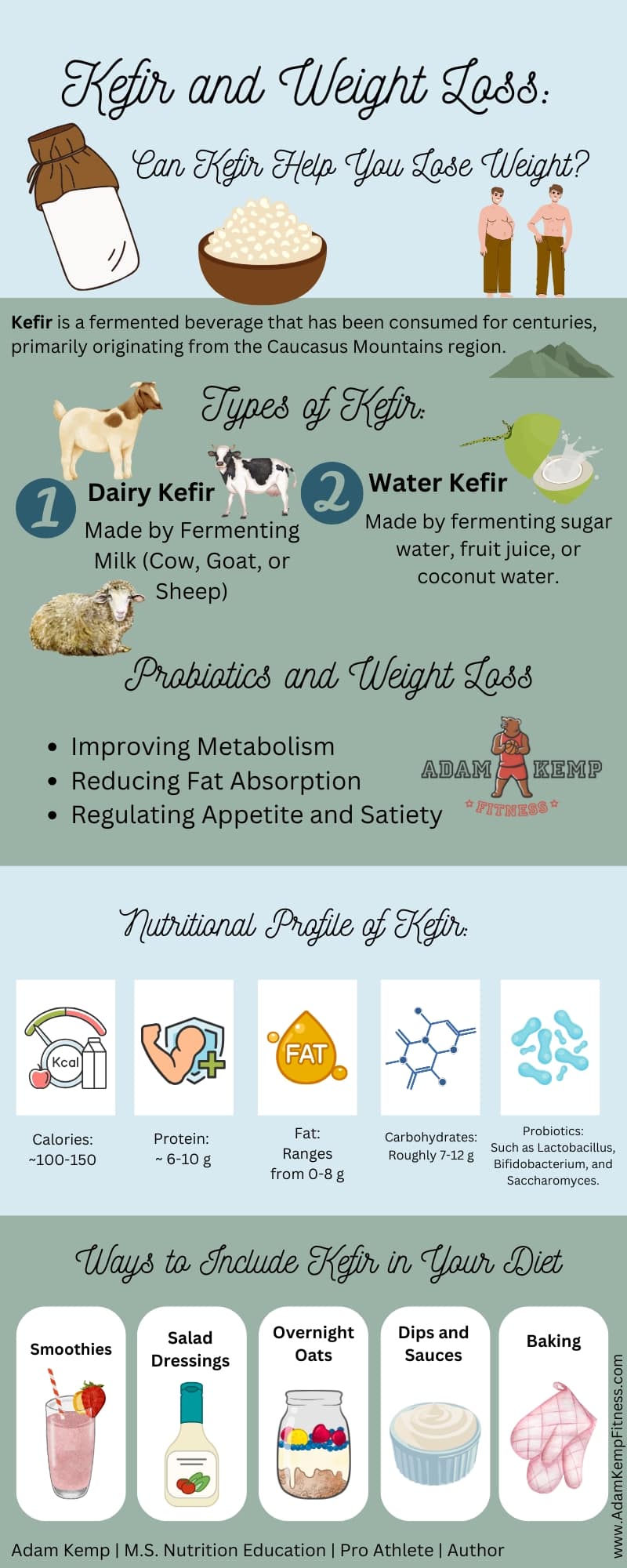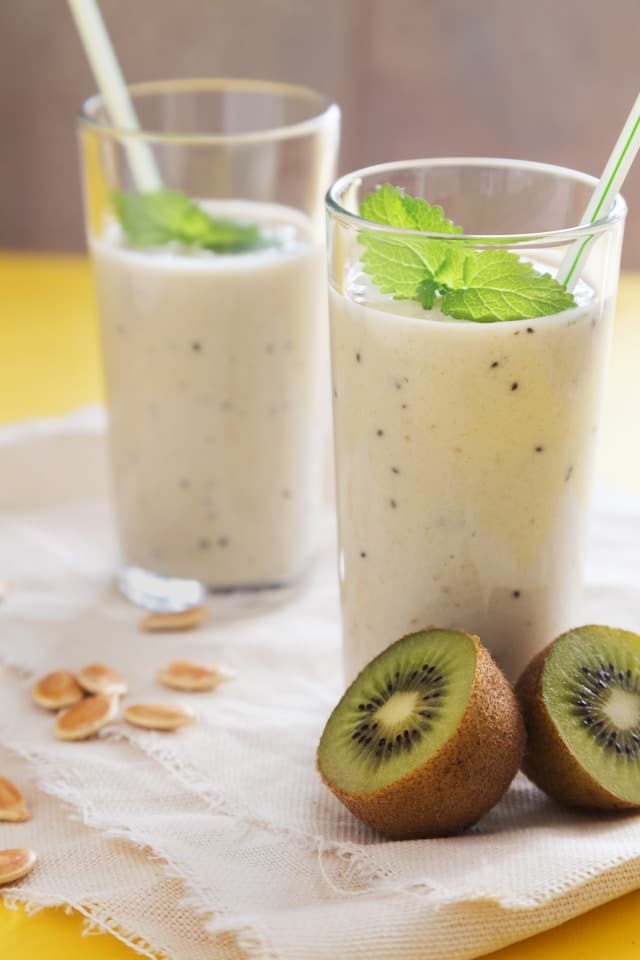Kefir for Weight Loss: Is Kefir Good for Losing Weight?
Originating from the Caucasus Mountains, kefir is known for its potential to improve digestion, boost immunity, and promote overall well-being.
This tangy, creamy beverage, created by fermenting milk with kefir grains, contains a wide variety of nutrients and bioactive compounds.
Even though I have issues digesting lactose and cannot drink milk, I love kefir and can comfortably consume it.
But can kefir help with weight loss?
Due to the probiotics and other bioactive compounds, kefir can interact with our gut microbiome and metabolic processes in ways that potentially influence body weight.
So yes, kefir can help you lose weight!
Here’s why:
What is Kefir?

Kefir is a fermented beverage that has been consumed for centuries, primarily originating from the Caucasus Mountains region.
Kefir is widely popular in Eastern Europe and Central Asia, which is where I originally developed a taste and love for this gut-friendly drink.
It is made by adding kefir grains—a combination of bacteria and yeast—to dairy milk or water.
These grains ferment the liquid, resulting in a tangy, slightly effervescent drink rich in probiotics, vitamins, and minerals.
Types of Kefir
There are two main types of kefir: dairy kefir and water kefir.
- Dairy Kefir: Made by fermenting milk (cow milk, goat milk, or sheep milk), dairy kefir has a creamy texture and a slightly sour taste. It is packed with beneficial bacteria, calcium, protein, and other essential nutrients.
- Water Kefir: Made by fermenting sugar water, fruit juice, or coconut water, water kefir is a lighter, non-dairy alternative that still provides a substantial dose of probiotics. It is suitable for those who are lactose intolerant or follow a vegan diet.
Nutritional Profile of Kefir
Kefir is highly nutritious, offering a variety of vitamins and minerals.
A typical serving of dairy kefir (one cup) contains:
- Calories: Approximately 100-150, depending on the fat content of the milk used.
- Protein: About 6-10 grams.
- Fat: Ranges from 0-8 grams, depending on whether it’s made from skim, low-fat, or whole milk.
- Carbohydrates: Roughly 7-12 grams, primarily from lactose.
- Probiotics: Contains various strains of beneficial bacteria and yeast, such as Lactobacillus, Bifidobacterium, and Saccharomyces.
In addition to these macronutrients, kefir is a good source of calcium, magnesium, phosphorus, vitamin B12, riboflavin (B2), and vitamin D (if fortified).
These nutrients contribute to overall health, supporting bones, muscles, and the immune system.
Why is Kefir Good for Weight Loss?
Kefir is an excellent choice for weight loss due to its rich probiotic content, which supports a healthy gut microbiome. The fermentation process of kefir introduces a diverse range of beneficial bacteria and yeasts, making it a powerful dietary source of probiotics that can aid weight management.
Incorporating kefir into your diet not only helps maintain balanced gut flora but also promotes improved metabolism and appetite regulation, both of which are essential for effective weight loss.
Research suggests that probiotics, like those found in kefir, play a crucial role in gut health and weight management.
A healthy gut microbiome, which kefir helps cultivate, is linked to various aspects of health, including weight regulation. Here are a few reasons drinking kefir for weight loss can be beneficial:

- Improving Metabolism: Probiotics in kefir can enhance metabolic functions, helping the body burn more calories and fat. Some probiotic strains in kefir increase the production of short-chain fatty acids, which can boost overall metabolism and energy expenditure.
- Reducing Fat Absorption: Kefir for weight loss may also work by influencing how the body absorbs dietary fats. Certain probiotics can reduce fat absorption in the intestines, promoting the excretion of fats and aiding in fat loss.
- Regulating Appetite and Satiety: The probiotics in kefir can help regulate hormones responsible for hunger and fullness, such as peptide YY and GLP-1. By improving satiety and reducing cravings, kefir can support better control over food intake.
These combined effects make kefir an excellent tool for supporting long-term weight management.
How to Use Kefir for Weight Loss

If you like yogurt, you’ll probably love kefir.
Adding kefir to your diet can be a simple and delicious way to boost your probiotic intake and support weight loss efforts.
Here are some practical tips and creative ideas that will help you use kefir for weight loss:
Best Time to Drink Kefir for Weight Loss
The timing of when you consume kefir can play a role in maximizing its benefits for weight loss. Here are some of the best times to drink kefir to support your weight loss journey:
Morning for a Nutrient-Rich Start
Drinking kefir in a smoothie or as a part of any metabolism-boosting breakfast plan is an excellent idea since it can provide your body with essential probiotics, proteins, and nutrients to fuel your day.
When consumed for breakfast or as part of a smoothie, kefir can keep you feeling full and satisfied, preventing mid-morning cravings and overeating later in the day.
Before or After Workouts for Muscle Recovery
Kefir’s protein content makes it an excellent option for supporting muscle recovery and energy replenishment. Consuming kefir after a workout in a post-workout smoothie is a great way to help repair muscle tissue and restore glycogen levels.
The probiotics in kefir may also aid digestion and reduce bloating, making it a great addition to your post-workout routine.
In the Evening for Better Digestion and Sleep
Kefir is rich in tryptophan, an amino acid that promotes relaxation and better sleep.
Drinking kefir in the evening can help regulate digestion overnight. This allows your body to process food efficiently while you rest and makes it appear you are losing weight overnight. A calm digestive system can also support weight loss by reducing nighttime cravings and ensuring that nutrients are properly absorbed.
As a Healthy Snack Between Meals
If you’re prone to snacking, having kefir between meals can help curb your appetite and keep you on track with your weight loss goals. Its nutrient content makes it a satisfying high-protein snack that helps regulate hunger hormones, preventing unhealthy cravings and overeating.
By incorporating kefir strategically into your day, you can optimize its benefits for weight loss while enjoying a healthy, probiotic-rich beverage that supports overall well-being.
Creative Ways to Include Kefir in Your Meals and Snacks
Incorporating kefir into your diet can be both fun and versatile.
Here are some ideas to get you started:
- Smoothies: My favorite way to enjoy kefir is to blend it with my favorite fruits and vegetables, a handful of nuts or seeds, some greens, and some protein powder for a nutritious and filling smoothie. The tangy flavor pairs well with berries, bananas, and leafy greens.
- Salad Dressings: Use kefir as a base for creamy salad dressings. Combine it with herbs, garlic, lemon juice, and a touch of olive oil for a healthy and delicious dressing.
- Overnight Oats: Mix kefir with oats, chia seeds, and fruits, then let it sit overnight in the refrigerator. In the morning, you’ll have a ready-to-eat, probiotic-rich breakfast.
- Dips and Sauces: Substitute kefir for yogurt or sour cream in dips and sauces. It works well in tzatziki, ranch dressing, and as a tangy addition to salsa.
- Baking: Use kefir in baking recipes as a substitute for buttermilk or yogurt. It adds moisture and a slight tang to pancakes, muffins, and bread.
How Much Kefir to Drink for Weight Loss
If you are planning to drink kefir to lose weight, I recommend you consume about one cup (8 ounces) per day.
This amount provides a good dose of probiotics and essential nutrients without adding excessive calories to your diet.
However, it’s important to listen to your body and adjust the intake based on your individual tolerance and dietary needs.
Incorporating kefir into your diet can be a delightful way to enhance your meals while supporting your weight loss journey.
With its versatility and health benefits, kefir can be a valuable addition to a balanced and nutritious diet.
Potential Side Effects and Considerations
While kefir offers numerous health benefits, it is essential to be aware of potential side effects and considerations to ensure it fits well within your dietary regimen.
Side Effects of Consuming Kefir for Weight Loss
For most people, kefir is safe and beneficial.
However, some individuals may experience mild side effects, especially when they first start consuming it:
- Digestive Discomfort: As your body adjusts to the influx of probiotics, you might experience bloating, gas, or stomach cramps. These symptoms are usually temporary and should subside as your gut microbiome adapts.
- Allergic Reactions: Though rare, some individuals may have allergic reactions to kefir, particularly if they are allergic to dairy. Symptoms might include itching, swelling, or difficulty breathing. If you experience any of these symptoms, discontinue use and consult a healthcare professional.
Lactose Intolerance & Milk Allergies
- Lactose Intolerance: While kefir contains less lactose than regular milk due to the fermentation process, it still contains some lactose. People with lactose intolerance may tolerate kefir better than milk, but it’s wise to start with small amounts to gauge your tolerance. Water kefir is a lactose-free alternative.
- Milk Allergies: Individuals with milk allergies should avoid dairy kefir altogether and opt for water kefir or other non-dairy probiotic sources.
Best Kefir for Weight Loss
When selecting kefir, it’s important to choose a product that aligns with your dietary preferences and health goals:
- Dairy vs. Water Kefir: Decide whether you prefer dairy or water kefir based on your tolerance to lactose and dietary preferences. Dairy kefir is richer in protein and calcium, while water kefir is a great non-dairy option.
- Look for Live Cultures: Ensure the kefir you choose contains live and active cultures to maximize probiotic benefits. Check the label for strains like Lactobacillus and Bifidobacterium.
- Avoid Added Sugars: Opt for plain, unsweetened kefir to avoid unnecessary sugars and calories. You can sweeten it naturally with fruits or a small amount of honey if desired.
If you live in the United States, my favorite brand is Lifeway Kefir.
Lifeway Kefir is one of the best kefir brands I have tried and their flavors are exceptional.
Last update on 2025-04-15 / This article includes affiliate links/Images via Amazon Product Advertising API. I may earn commissions on purchases made through these links.
Final Thoughts: Does Kefir Help You Lose Weight?
Kefir can be a valuable addition to a balanced diet when consumed in moderation, but it’s essential to integrate it into a well-rounded nutritional plan.
Relying solely on kefir or any single food for weight loss can lead to nutrient imbalances and digestive issues.
For optimal results, include a variety of nutrient-dense foods—such as fruits, vegetables, whole grains, lean proteins, and healthy fats—alongside kefir to ensure you meet all your dietary needs.
As a fermented, probiotic-rich beverage, kefir supports weight loss by promoting a healthy gut microbiome, improving digestion, enhancing metabolism, and regulating appetite. Its protein content and ability to help manage blood sugar levels make it particularly effective in supporting satiety and overall metabolic health.
Whether you blend it into smoothies, use it in salad dressings, or incorporate it into snacks like overnight oats, kefir’s versatility makes it easy to enjoy while supporting your weight management goals.
While kefir is generally safe, individuals new to consuming it should start with small amounts to assess their body’s tolerance.
For those who are lactose intolerant or have milk allergies, water kefir is an excellent non-dairy alternative, providing similar probiotic benefits without the lactose.
By incorporating kefir thoughtfully into a balanced diet and maintaining healthy eating habits, it can be an effective tool to support long-term weight management and overall well-being.




